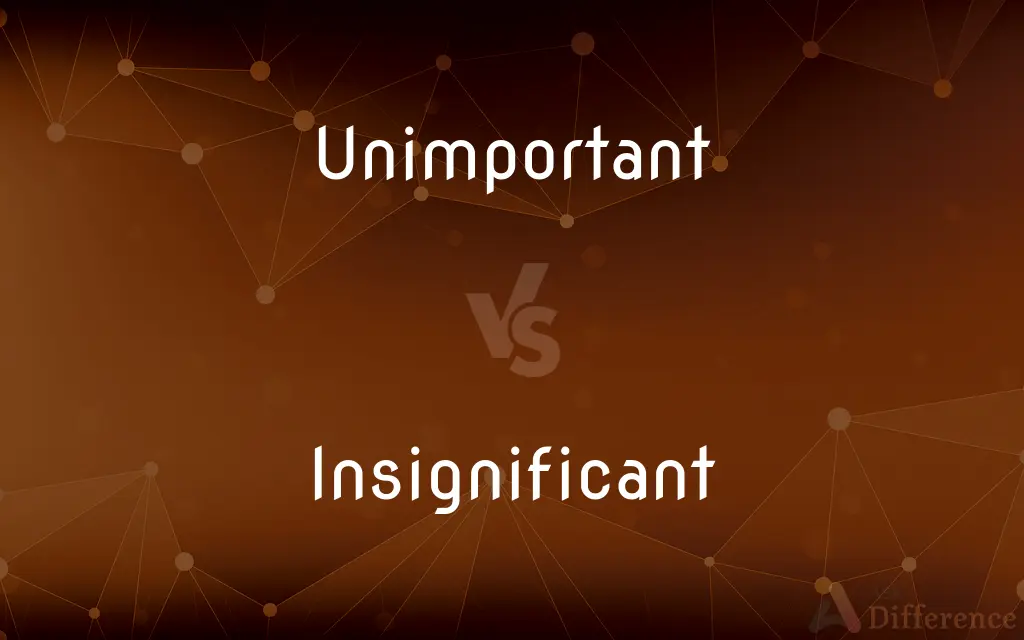Unimportant vs. Insignificant — What's the Difference?
By Maham Liaqat & Urooj Arif — Updated on April 15, 2024
Unimportant pertains to lacking relevance or priority in a specific context, while insignificant means negligible impact or value universally.

Difference Between Unimportant and Insignificant
Table of Contents
ADVERTISEMENT
Key Differences
Unimportant refers to things that do not hold priority or urgency in a given situation, whereas insignificant describes elements that are trivial or negligible in scale or effect.
In a work context, a task may be deemed unimportant if it doesn't affect the overall project outcome, while an insignificant task is one whose completion or omission makes no noticeable difference.
Unimportant issues might still warrant some attention depending on the circumstances, whereas insignificant issues are often overlooked because their resolution contributes little to no value.
When prioritizing tasks, something unimportant might be postponed to a later time, on the other hand, something insignificant might be discarded altogether.
An unimportant detail might be skipped in a presentation without much consequence, whereas an insignificant detail might not even be considered for inclusion.
ADVERTISEMENT
Comparison Chart
Impact on Outcome
Minimal impact, might affect nuances
No impact, does not affect outcome
Attention Given
May receive some attention
Often overlooked or ignored
Context Dependence
Highly context-dependent
Generally context-independent
Potential for Change
Can become important in other contexts
Rarely changes in significance
Usage in Conversation
Used to deprioritize in discussions
Used to denote lack of value or effect
Compare with Definitions
Unimportant
Not essential to the main issue at hand.
Ignore the unimportant details and focus on the goal.
Insignificant
Too small or unimportant to be worth consideration.
The differences were insignificant, barely noticeable.
Unimportant
Trivial or minor in the larger scheme.
For major stakeholders, these concerns are unimportant.
Insignificant
Not substantial enough to alter or affect a situation.
The budget changes were insignificant.
Unimportant
Lacking influence or power in a particular situation.
His opinion was unimportant in the final decision.
Insignificant
Negligible in the context of larger events.
The corrections made were insignificant to the overall document.
Unimportant
Not significant enough to warrant attention.
They skipped over the unimportant chapters in the meeting.
Insignificant
Having little to no detectable impact or effect.
His contribution to the project was insignificant.
Unimportant
Lesser in urgency compared to other tasks or issues.
Addressing that issue is unimportant right now.
Insignificant
Lacking in size, value, or importance.
The error was insignificant and didn't affect the outcome.
Unimportant
Not important; insignificant or petty.
Insignificant
Not large enough to consider or notice
Unimportant
Petty; not important or noteworthy
Insignificant
Lacking in importance; trivial.
Unimportant
Not important;
A relatively unimportant feature of the system
The question seems unimportant
Insignificant
Lacking power, position, or value; worthy of little regard.
Unimportant
Not important or noteworthy
Insignificant
Small in size or amount.
Insignificant
Having little or no meaning.
Insignificant
Not significant; not important, inconsequential, or having no noticeable effect.
Such things are insignificant details compared to the main goal.
Insignificant
Without meaning; not signifying anything.
Insignificant
Not significant; void of signification, sense, or import; meaningless; as, insignificant words.
Insignificant
Having no weight or effect; answering no purpose; unimportant; valueless; futile.
Laws must be insignificant without the sanction of rewards and punishments.
Insignificant
Without weight of character or social standing; mean; contemptible; as, an insignificant person.
Insignificant
Not worthy of notice
Insignificant
Signifying nothing;
Insignificant sounds
His response...is picayune and unmeaning
Insignificant
Of little importance or influence or power; of minor status;
A minor, insignificant bureaucrat
Peanut politicians
Insignificant
Not important or noteworthy
Common Curiosities
What does it mean when something is called unimportant?
It means it does not hold much priority or urgency in the current context.
How does insignificant differ in usage from unimportant?
Insignificant implies a lack of worth or value, generally applicable universally, unlike unimportant which is context-sensitive.
What makes an issue insignificant?
An issue is considered insignificant if its resolution or occurrence does not alter outcomes or perceptions significantly.
How should one handle unimportant tasks at work?
They should be prioritized lower than more urgent and important tasks.
Why might someone focus on insignificant details?
This could be due to a misunderstanding of their impact, or a meticulous or perfectionist approach.
Does cultural context affect what is considered insignificant?
Yes, cultural perspectives can influence what is considered significant or insignificant.
When should one ignore insignificant details?
When focusing on achieving broader goals or when time and resources are limited.
How do priorities affect whether something is considered unimportant?
Priorities determine the level of importance and urgency attached to tasks, influencing their classification as unimportant.
Is it possible for something insignificant to have any positive effects?
Typically, insignificant elements have minimal to no effects, positive or otherwise.
What kind of impact does an insignificant error have?
An insignificant error typically has little to no impact on the overall functionality or outcome.
Can an unimportant task become significant?
Yes, depending on changes in the situation or context.
What is an example of an unimportant decision?
Choosing a background color for a non-critical internal presentation could be unimportant.
Can the perception of something being unimportant change?
Yes, as circumstances and contexts evolve, the importance of various issues can also change.
Can focusing on insignificant things be beneficial?
Rarely, as it usually diverts attention and resources from more critical areas.
How do organizations decide what is unimportant?
Organizations typically assess the impact, urgency, and relevance of tasks or decisions to decide their importance.
Share Your Discovery

Previous Comparison
Mix vs. Premix
Next Comparison
Castle vs. CottageAuthor Spotlight
Written by
Maham LiaqatCo-written by
Urooj ArifUrooj is a skilled content writer at Ask Difference, known for her exceptional ability to simplify complex topics into engaging and informative content. With a passion for research and a flair for clear, concise writing, she consistently delivers articles that resonate with our diverse audience.













































